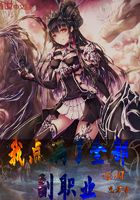of it whenever an occasion offers. Indeed, though Indians are generally very lofty, rhetorical, andfigurative in their language at all great talks, and high ceremonials, yet, if trappers and tradersmay
be believed, they are the most unsavory vagabonds in their ordinary colloquies; they make nohesitation to call a spade a spade; and when they once undertake to call hard names, the famouspot
and kettle, of vituperating memory, are not to be compared with them for scurrility of epithet.
To escape the infliction of any compliments of this kind, or the launching, peradventure, ofmore
dangerous missiles, Wyeth landed with the best grace in his power and approached the chief ofthe
band. It was Arapooish, the quondam friend of Rose the outlaw, and one whom we have alreadymentioned as being anxious to promote a friendly intercourse between his tribe and the whitemen.
He was a tall, stout man, of good presence, and received the voyagers very graciously. Hispeople,
too, thronged around them, and were officiously attentive after the Crow fashion. One took agreat
fancy to Baptiste the Flathead boy, and a still greater fancy to a ring on his finger, which hetransposed to his own with surprising dexterity, and then disappeared with a quick step amongthe
crowd.
Another was no less pleased with the Nez Perce lad, and nothing would do but he mustexchange
knives with him; drawing a new knife out of the Nez Perce's scabbard, and putting an old one inits
place. Another stepped up and replaced this old knife with one still older, and a third helpedhimself
to knife, scabbard and all. It was with much difficulty that Wyeth and his companions extricatedthemselves from the clutches of these officious Crows before they were entirely plucked.
Falling down the river a little further, they came in sight of the second band, and sheered tothe
opposite side, with the intention of passing them. The Crows were not to be evaded. Somepointed
their guns at the boat, and threatened to fire; others stripped, plunged into the stream, and cameswimming across. Making a virtue of necessity, Wyeth threw a cord to the first that came withinreach, as if he wished to be drawn to the shore.
In this way he was overhauled by every band, and by the time he and his people came out ofthe busy
hands of the last, they were eased of most of their superfluities. Nothing, in all probability, butthe
proximity of the American trading post, kept these land pirates from ****** a good prize of thebull
boat and all its contents.
These bands were in full march, equipped for war, and evidently full of mischief. Theywere, in fact,
the very bands that overran the land in the autumn of 1833; partly robbed Fitzpatrick of hishorses
and effects; hunted and harassed Captain Bonneville and his people; broke up their trappingcampaigns, and, in a word, drove them all out of the Crow country. It has been suspected thatthey were
set on to these pranks by some of the American Fur Company, anxious to defeat the plans oftheir
rivals of the Rocky Mountain Company; for at this time, their competition was at its height, andthe
trade of the Crow country was a great object of rivalry. What makes this the more probable, is,that
the Crows in their depredation seemed by no means bloodthirsty, but intent chiefly on robbingthe
parties of their traps and horses, thereby disabling them from prosecuting their hunting.
We should observe that this year, the Rocky Mountain Company were pushing their way upthe
rivers, and establishing rival posts near those of the American Company; and that, at the verytime
of which we are speaking, Captain Sublette was ascending the Yellowstone with a keel boat,laden
with supplies; so that there was every prospect of this eager rivalship being carried to extremes.
The last band of Crow warriors had scarcely disappeared in the clouds of dust they hadraised, when
our voyagers arrived at the mouth of the river and glided into the current of the Yellowstone.
Turning down this stream, they made for Fort Cass, which is situated on the right bank, aboutthree
miles below the Bighorn. On the opposite side they beheld a party of thirty-one savages, whichthey
soon ascertained to be Blackfeet. The width of the river enabled them to keep at a sufficientdistance,
and they soon landed at Fort Cass. This was a mere fortification against Indians; being a stockadeof about one hundred and thirty feet square, with two bastions at the extreme corners. M'Tulloch,an agent of the American Company, was stationed there with twenty men; two boats of fifteentons
burden were lying here; but at certain seasons of the year a steamboat can come up to the fort.
They had scarcely arrived, when the Blackfeet warriors made their appearance on theopposite bank,
displaying two American flags in token of amity. They plunged into the river, swam across, andwere kindly received at the fort. They were some of the very men who had been engaged, theyear
previously, in the battle at Pierre's Hole, and a fierce-looking set of fellows they were; tall andhawk-nosed, and very much resembling the Crows. They professed to be on an amicable errand,to make
peace with the Crows, and set off in all haste, before night, to overtake them. Wyeth predictedthat
they would lose their scalps; for he had heard the Crows denounce vengeance on them, forhaving
murdered two of their warriors who had ventured among them on the faith of a treaty of peace. Itis
probable, however, that this pacific errand was all a pretence, and that the real object of theBlackfeet
braves was to hang about the skirts of the Crow band, steal their horses, and take the scalps ofstragglers.
At Fort Cass, Mr. Wyeth disposed of some packages of beaver, and a quantity of buffalorobes. On
the following morning (August 18th), he once more launched his bull boat, and proceeded downthe
Yellowstone, which inclined in an east-northeast direction. The river had alluvial bottoms,fringed















